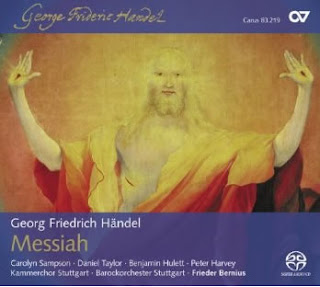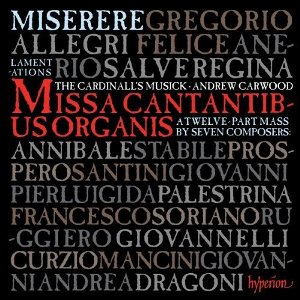Handel: The Messiah
Originally published on musicalcriticism.com
07 June 2009
Handel's anniversary year is proving to offer many a rich feast on his larger-scale works with his oratorios and operas featuring in many of the major festivals around the world. Of course Messiah has always been famous for its enduring appeal, but even performances of this work seem to have increased as a result of the celebrations.
In this new recording from Frieder Bernius the soloists are an impressive selection. Carolyn Sampson is one of my favourite sopranos for Messiah performances and here the energy in her performance of the accompagnato-recitative sequence in 'Part the First' is terrifically exciting, and this carries over into 'Rejoice greatly' which is also incredibly impressive, although I do wish that Bernius had allowed just a little more time for the central section as 'And he shall speak' is just slightly too brisk for my taste. I also particularly enjoyed 'If God be for us' for which Sampson finds some rich and passionate vocal colours that must be the envy of many sopranos.
Benjamin Hulett and Peter Harvey are also appropriately commanding in this performance. Hulett is still relatively new to the early music scene but performs an impressive pair of arias at the beginning of the work and an especially touching 'Behold and see, if there be any sorrow' in the second part. Peter Harvey is, of course, one of the most experienced basses on the period-performance scene and it really shows. His aria 'Why do the nations' has astonishing gravitas and, with Bernius and his orchestra at their very best, makes for an incredibly exciting performance. However, I'm really surprised to say that I didn't enjoy Daniel Taylor's performances; undoubtedly he has an exquisite instrument but I just find his manner of singing too fey for this oratorio. In my opinion there ought to be a good element of declamation involved since one is, after all, telling a story which is arguably the greatest ever told. But rather than responding to this challenge, Taylor makes a self-consciously pretty sound which tends to get in the way of both the text and its pronunciation: 'Far he is like a refiners fire' for instance, and the resulting effect is rather anaemic. Some people like this style but I find it rather out of place in oratorio and would prefer some more meat on the sound to better reflect the enormity of the sentiments being expressed.
Kammerchor Stuttgart, however, are electric all the way through this album. I love the clear textures and the excitement in 'And He shall purify' and the sense of desolation in 'Surely He hath borne our griefs'. There are many different colours from this choir and their blend is well managed too. The score used is based on Ton Koopman's new urtext edition and Bernius opts for some brisk tempi that keeps the work moving forward nicely without overly rushing. The Barokorchester Stuttgart are a skillful ensemble who play with confidant phrasing and lots of personality throughout, and the beautiful transparency of this recording process allows the listener to hear all of their details clearly.
Frieder Bernius's new recording is a welcome addition to the ever-swelling catalogue of Messiahs and is particularly welcome on SACD format.
Sampson, Taylor, Hulet, Harvey; Kammerchor & Barockorchester Stuttgart/Bernius (Carus 83.219)
07 June 2009
Handel's anniversary year is proving to offer many a rich feast on his larger-scale works with his oratorios and operas featuring in many of the major festivals around the world. Of course Messiah has always been famous for its enduring appeal, but even performances of this work seem to have increased as a result of the celebrations.
In this new recording from Frieder Bernius the soloists are an impressive selection. Carolyn Sampson is one of my favourite sopranos for Messiah performances and here the energy in her performance of the accompagnato-recitative sequence in 'Part the First' is terrifically exciting, and this carries over into 'Rejoice greatly' which is also incredibly impressive, although I do wish that Bernius had allowed just a little more time for the central section as 'And he shall speak' is just slightly too brisk for my taste. I also particularly enjoyed 'If God be for us' for which Sampson finds some rich and passionate vocal colours that must be the envy of many sopranos.
Benjamin Hulett and Peter Harvey are also appropriately commanding in this performance. Hulett is still relatively new to the early music scene but performs an impressive pair of arias at the beginning of the work and an especially touching 'Behold and see, if there be any sorrow' in the second part. Peter Harvey is, of course, one of the most experienced basses on the period-performance scene and it really shows. His aria 'Why do the nations' has astonishing gravitas and, with Bernius and his orchestra at their very best, makes for an incredibly exciting performance. However, I'm really surprised to say that I didn't enjoy Daniel Taylor's performances; undoubtedly he has an exquisite instrument but I just find his manner of singing too fey for this oratorio. In my opinion there ought to be a good element of declamation involved since one is, after all, telling a story which is arguably the greatest ever told. But rather than responding to this challenge, Taylor makes a self-consciously pretty sound which tends to get in the way of both the text and its pronunciation: 'Far he is like a refiners fire' for instance, and the resulting effect is rather anaemic. Some people like this style but I find it rather out of place in oratorio and would prefer some more meat on the sound to better reflect the enormity of the sentiments being expressed.
Kammerchor Stuttgart, however, are electric all the way through this album. I love the clear textures and the excitement in 'And He shall purify' and the sense of desolation in 'Surely He hath borne our griefs'. There are many different colours from this choir and their blend is well managed too. The score used is based on Ton Koopman's new urtext edition and Bernius opts for some brisk tempi that keeps the work moving forward nicely without overly rushing. The Barokorchester Stuttgart are a skillful ensemble who play with confidant phrasing and lots of personality throughout, and the beautiful transparency of this recording process allows the listener to hear all of their details clearly.
Frieder Bernius's new recording is a welcome addition to the ever-swelling catalogue of Messiahs and is particularly welcome on SACD format.
Sampson, Taylor, Hulet, Harvey; Kammerchor & Barockorchester Stuttgart/Bernius (Carus 83.219)



Comments
Post a Comment